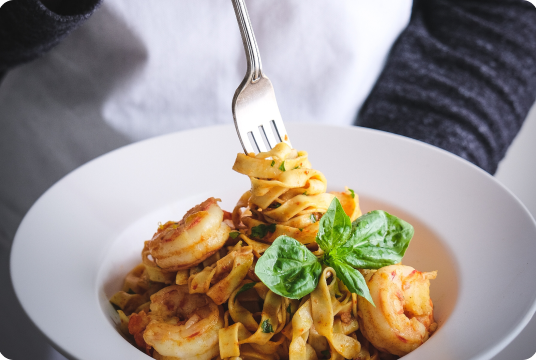From Michael Mastrucci (@themacrodiabetic)
Two hormones have a major influence on energy balance: leptin and ghrelin. Leptin mediates long-term energy regulation and is responsible for decreasing hunger. Ghrelin is the yin to leptin’s yang, a fast-acting hormone that increases hunger.
When you’re cutting, putting your body in an intentional caloric deficit, the body’s subconscious response is to increase ghrelin which leads to cravings and hunger pangs. This is true even in short cutting periods. And if you give in to these cravings, your cutting will have been for nothing! Here are eight ways to counteract the body’s hunger response:

1. Caffeine
Black coffee’s caffeine content can blunt hunger. However, it’s not a panacea and I wouldn’t recommend downing a pot later in the day.

2. Distractions
There’s nothing like watching your favorite show or a movie during dinner to help you chill out after a long day, and mild hunger can fade when our minds are distracted with entertainment. Take care to fully enjoy your food — chew thoroughly, swallow, set your fork down, take a sip of water. It’s not a race.

3. Fasting
Some people have no trouble pushing their meals until later in the day, and fasting can be effective for fat loss — but it is definitely not REQUIRED. Before jumping on the fasting bandwagon pay close attention to how it affects your energy levels. There’s no reason to force your body to take on additional stress when already in a deficit.

4. Flavor
If you’re finding your food a little bland, adding spices and other flavors can make it more palatable without adding excessive amounts of sodium or sugar — ICON Flavor Seasonings are a great example. Too much salt and sugar can numb taste receptors over time, leave you feeling hungry, and make lightly-seasoned foods less satisfying.

5. Hydration
Drinking water is far better than eating more calories when maintaining a deficit. Most importantly, you need water to help regulate a vast number of physiological processes and stay healthy. Drinking water before and after a meal (and in between bites) helps to promote fullness and keeps your digestive system working properly.

5. Nutrients
Whole foods are your best bet for overall health. 200 calories of potato chips are mostly empty of valuable nutrition —instead, opt for veggies or micronutrient-dense foods to get far more bang for your caloric buck. Additionally, nutrient-dense foods often provide your body with better energy levels and can be much easier on digestion.

6. Mentality
Going to bed hungry is a big pet peeve of mine, so I like to save the majority of my daily calories for the last meal of the day. This doesn’t agree with everyone, and that’s ok. After you’ve eaten dinner, it’s important to remember that you’re not going to starve. If you get those post-dinner cravings, drink water, stay occupied, and see how you feel in 20 minutes.

7. Sleep
Sleep affects hormone regulation, and lack of it will put leptin and ghrelin out of balance. To prevent cravings and dips in your energy, your body needs to get full, complete rest. This is doubly important when you’re intentionally depriving yourself of calories.

8. Utensil Size
Psychological tricks can help us feel fuller without actually changing our food. Smaller silverware and dishes visually trick our minds into thinking our portions are larger and therefore more satisfying.